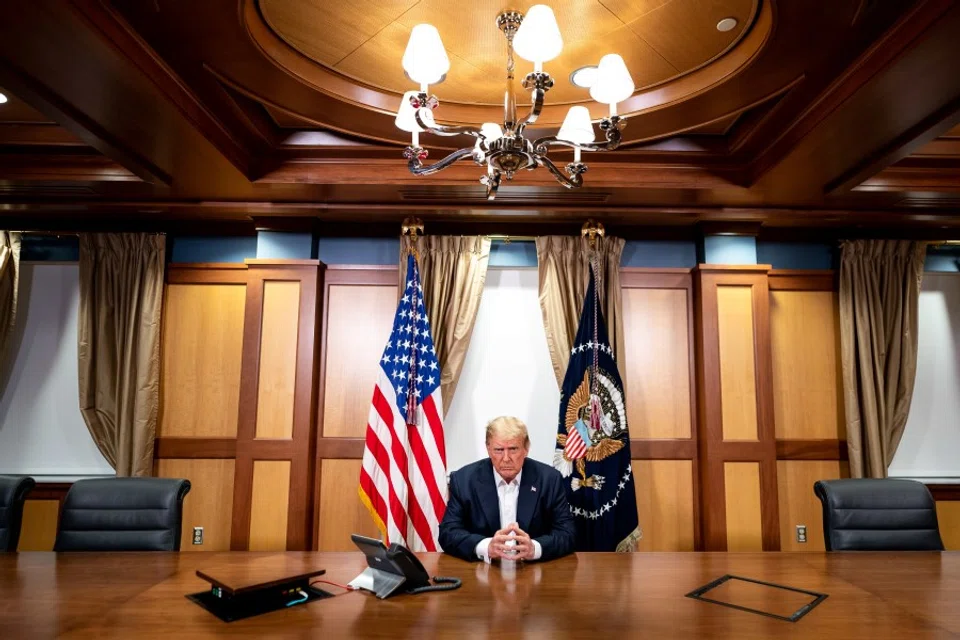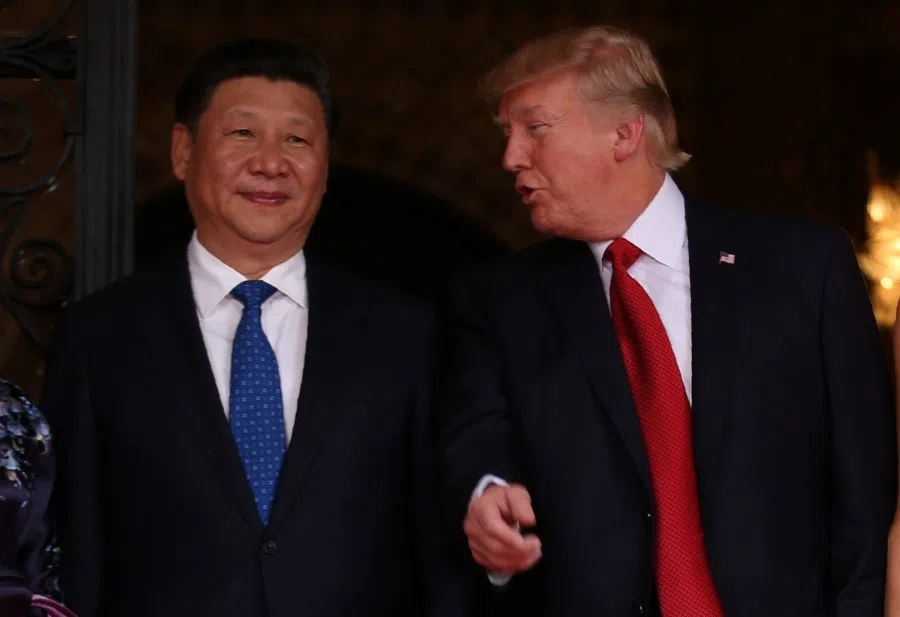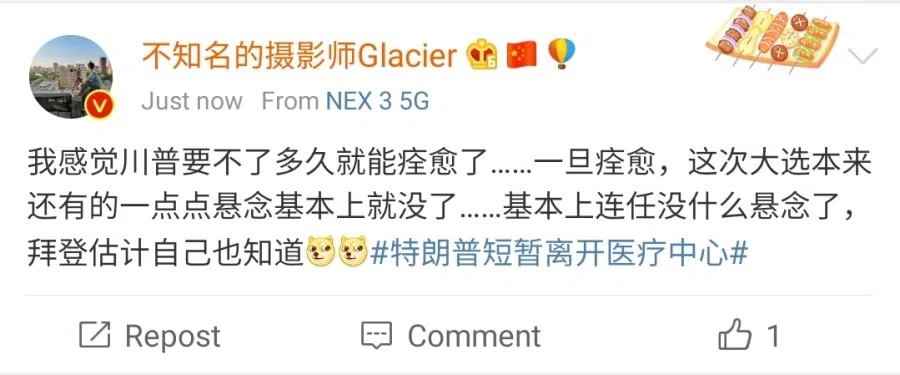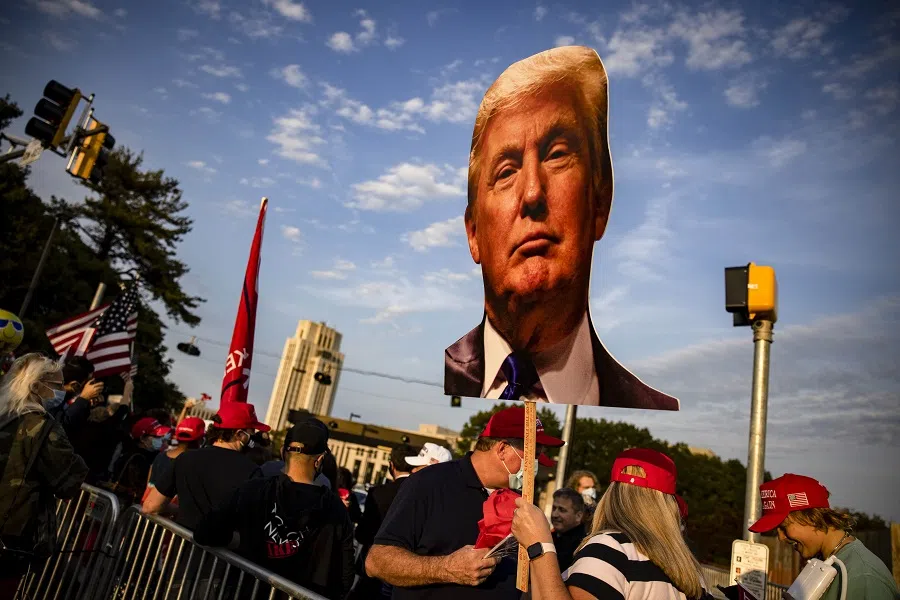Chinese pundits question Trump's diagnosis: Is it the biggest show on earth?
With Trump testing positive for the coronavirus, reactions in China range from schadenfreude among the internet community, to more dignified responses from the Chinese authorities. Zaobao correspondent Yu Zeyuan scans sentiments in China and thinks about possible implications for the upcoming US presidential election and the future of US-China relations.

The news of US President Donald Trump and his wife testing positive for the coronavirus has sparked varied responses in China. Many netizens feel it is "retribution" for Trump's downplaying the dangers of the coronavirus and blaming China for it; there has been mockery and a sense of schadenfreude among the internet community.
However, the Chinese authorities have not been guided by these online sentiments. Foreign Ministry spokesperson Hua Chunying tweeted in English on 2 October: "Saddened to learn #President and the #FirstLady of the #US tested positive. Hope they both have a speedy recovery and will be fine."
On 3 October, Chinese President Xi Jinping sent a message to Trump: "Upon learning that Mr President and Mrs Melania are infected with the novel coronavirus, my wife Peng Liyuan and I extend our sympathy and wish you and your wife a speedy recovery."
After the Chinese foreign ministry wished the Trumps a speedy recovery, Xi also sent his regards - this show of humanity is obviously more helpful to China's image than staying silent.

China's official response has been dignified. Since the China-US trade war began in 2018, and especially since the coronavirus broke in China, the US has been closing in on China, and relations have hit a low, with a lot of pressure brought to bear on China, from authorities to ordinary people. In this context, it would be understandable even if the Chinese authorities had stayed silent on Trump getting infected.
But the coronavirus is a common enemy of humankind right now, and it is human to ask after those who are ill. After the Chinese foreign ministry wished the Trumps a speedy recovery, Xi also sent his regards - this show of humanity is obviously more helpful to China's image than staying silent.
As for the gloating online comments, that can be put down as personal venting. Most people in China felt the pain of US aggression and the impact of the coronavirus, and now that Trump has finally "caught it", inevitably some people are cheering. However, this is not the mainstream sentiment in China.
Has testing positive for Covid-19 increased Trump's chance of winning?
Comments in China are more focused on how Trump's illness will affect the US presidential election and more significantly, China-US relations thereafter. Some feel that the infection might not only have little or no impact on his campaign, but could even be a bid for sympathy votes, which would ultimately help the currently trailing Trump get re-elected. Others say that Trump's illness will lead to victory for Democratic candidate Joe Biden, and Trump will probably lose.
Trump testing positive for Covid-19 is but a first step in a larger plot. - Wang Hongguang, former deputy commander of the People's Liberation Army's Nanjing military area command

The former deputy commander of the People's Liberation Army's Nanjing military area command Wang Hongguang analysed in an article that Trump testing positive for Covid-19 is but a first step in a larger plot. Next, Trump will put up a fierce fight with the coronavirus in an attempt to win sympathy votes. He will then conquer the virus, proving that if a 70-over-year-old like him can overcome it, Covid-19 is indeed just "like the flu". Lastly, he will reassure the people that they need not worry about the coronavirus as he has experienced and defeated it. By extension, the US will be able to defeat the virus under his lead and achieve economic recovery. In the end, Trump will overtake competitor Joe Biden and win the presidential election.
Biden's team, on the other hand, has plans to unite the US's traditional allies to contain China. As such, Biden could pose a greater threat to China than Trump.
According to a Sanlian Life Week magazine (《三联生活周刊》) article published yesterday, Trump's Covid-19 diagnosis will increase the uncertainties in the US presidential election outcomes. Before Trump's illness, Biden's victory and Trump's defeat a month later is relatively certain. However, hoping that Trump's failure will improve China's external environment is wishful thinking.
The article went on to say that Trump's eccentric ways and style of diplomacy have created a rift between the US and its traditional European allies. Biden's team, on the other hand, has plans to unite the US's traditional allies to contain China. As such, Biden could pose a greater threat to China than Trump. A scenario where Biden is elected president, and succeeds in uniting European countries to contain China is one that China is more unwilling to face.

US-China relations likely to remain mired in difficulties
As for China-US relations, whoever becomes the next US president, it is unlikely for both countries to return to the state of relations prior to the China-US trade war in the short term. As for how the US would deal with China, both the Democratic and Republican parties hold the same stance, and suppressing China would be their main means of conducting US-China policy. This is not only what US elites agree on but a conclusion that Chinese elites have reached as well.
In fact, few people in China believe that China-US relations will improve once a different president is elected. China-US competition is not only a manifestation of the conflict between the values and systems of both sides, but also the result of a conflict of interest between a rising power and an incumbent power.
On the other hand, however, we need not be too pessimistic over the state of China-US relations. As two of the world's largest economies and nuclear powers, no matter how big the conflict between China and the US is, it is difficult for both sides to completely decouple from each other, let alone wage war with each other.

![[Big read] Paying for pleasure: Chinese women indulge in handsome male hosts](https://cassette.sphdigital.com.sg/image/thinkchina/c2cf352c4d2ed7e9531e3525a2bd965a52dc4e85ccc026bc16515baab02389ab)


![[Big read] How UOB’s Wee Ee Cheong masters the long game](https://cassette.sphdigital.com.sg/image/thinkchina/1da0b19a41e4358790304b9f3e83f9596de84096a490ca05b36f58134ae9e8f1)
